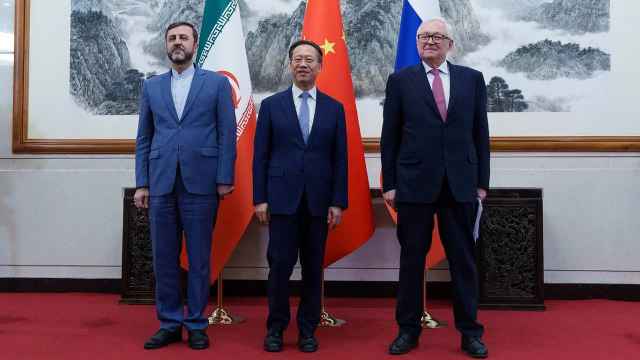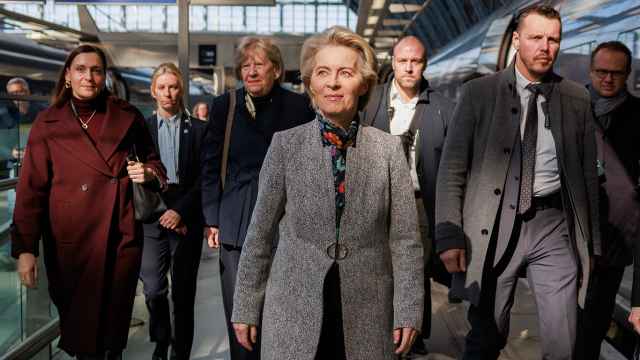It is not often that a head of state publicly throws up his arms in frustration when asked about a minor tariff issue.
But President Dmitry Medvedev nearly blew his top when recently questioned about why the customs union has failed to lift hefty import duties on foreigners' household items despite endless promises to do so.
"We are looking all over the world for investment and intellectual products, and then people demand that they pay again and again," Medvedev fumed during a with scientists at the Skolkovo development school. "It's absolutely foolish to continue to make these demands."
"It makes me want to throw a microphone at the wall," he said in late October, according to Interfax.
While Medvedev managed to contain his anger and not smash the audio equipment, the outburst raised a puzzling question — if Russia isn't calling the shots within the customs union, who is?
The commission of the trade bloc, which consists of Russia and its much smaller partners Belarus and Kazakhstan, first promised to do away with the regulations in November 2010, but the change has repeatedly been pushed back for reasons that have never been explained.
Even Prime Minister Vladimir Putin's decree in May that the tariffs be abolished had no effect as the staggeringly high duties — which can amount to $20,000 for basic household goods — remain in place.
The never-ending negotiations to lift the tariffs that have hit foreign professionals with fees of 4 euros ($5.40) a kilogram has left everyone involved fuming.
Officials say the holdup can be laid firmly at the feet of the customs union itself, which has repeatedly refused to put the change into effect despite all parties having signed off on it.
"All three countries have agreed on the procedure to fix the problem and the orders have been sent to the customs union and there they remain," said Alexander Machevsky, spokesman for Deputy Prime Minister Igor Shuvalov, whose office has been involved in clearing the logjam.
Repeated calls to a customs union spokesman have gone unanswered and several e-mailed messages have not been returned.
Medvedev said even ironing out such a minor issue may require an entire rethink of how things are being done.
"It's a big, systemic problem," he said late last month. "I am afraid anything but radical change won't do, though this has already occurred more than once."
Still, the heads of all three governments reaffirmed their commitment to the union just last week — signing a declaration vowing even stronger ties.
But the delay on the foreigner tax has left business leaders wringing their hands.
"They told us that this would be resolved over the summer," said Vladimir Kobzev, head lawyer for the Russo-German Chamber of Commerce. "Then August came and the customs union experts said they had questions and needed to consult with one another further."
"Then September came with no action and then October and so on, and we still have not heard from the commissioner's office," he said. "We've been flooded with calls from companies wondering what's going on and all we can tell them is that it is hung up in the bureaucracy."
The uncertainty has created headaches for foreigners moving to Russia and has resulted in more than its share of horror stories.
When Washington Post correspondents Kathy Lally and Will Englund arrived in Moscow in September 2010, they chose to keep their household items in storage to avoid the steep customs duties they were promised would soon be lifted.
"They kept assuring us it would be changed," Lally said.
The move turned into a bureaucratic odyssey that left them having to plow through a winter without any of their belongings.
When nothing had happened by the end of December, Lally said they decided to pay the duty only to find out that they were now subject to fines for leaving their things in storage for too long. They were told their items could not be released until an investigation had been completed.
"Eventually some elderly man rang our doorbell with a telegram that informed us the fine amounted to some $50. But then it took a while to figure out how to actually pay it," she said. "We didn't get our shipment until mid-May."
"Looking back, I wish we had just cleared it immediately, but it seemed the regulation was about to be changed and it would be foolish to spend all that money," she said. "We were very happy to have our dishes and rugs and furniture back."
A Message from The Moscow Times:
Dear readers,
We are facing unprecedented challenges. Russia's Prosecutor General's Office has designated The Moscow Times as an "undesirable" organization, criminalizing our work and putting our staff at risk of prosecution. This follows our earlier unjust labeling as a "foreign agent."
These actions are direct attempts to silence independent journalism in Russia. The authorities claim our work "discredits the decisions of the Russian leadership." We see things differently: we strive to provide accurate, unbiased reporting on Russia.
We, the journalists of The Moscow Times, refuse to be silenced. But to continue our work, we need your help.
Your support, no matter how small, makes a world of difference. If you can, please support us monthly starting from just $2. It's quick to set up, and every contribution makes a significant impact.
By supporting The Moscow Times, you're defending open, independent journalism in the face of repression. Thank you for standing with us.
Remind me later.





